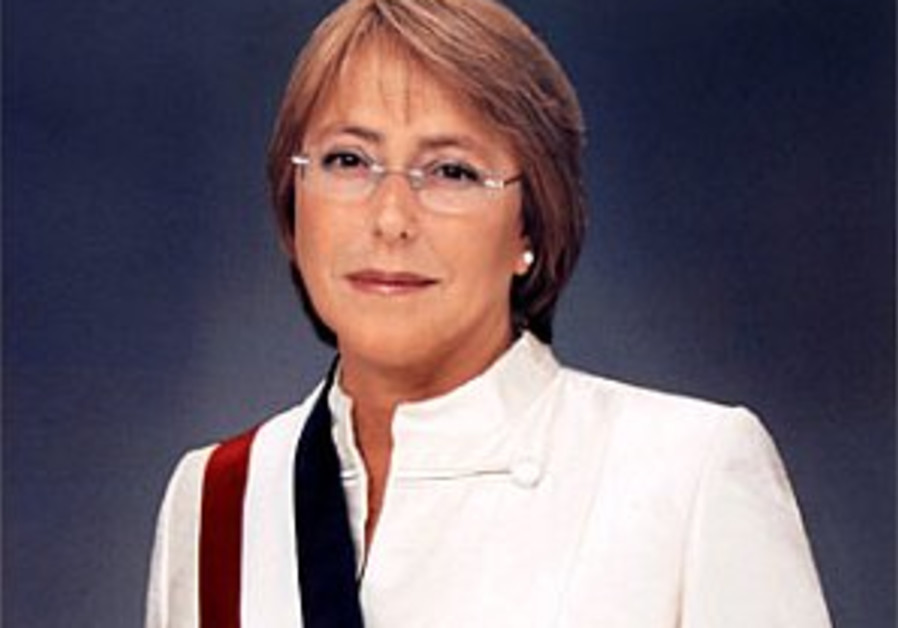Haley: New human rights chief must address UNHRC failures, Israel bias

Michelle Bachelet 298. (photo credit: Nancy Coste)
Former Chilean president Michelle Bachelet has been nominated to the position of UN High Commissioner for Human Rights, a post whose past office holders have often had a contentious relationship with Israel.
The commissioner does not control the UN Human Rights Council, but it is run through that office and part of Bachelet’s new job will be to report to the UNHRC.
Among the issues immediately on her table, would be the “black list” which the commissioner’s office has been compiling of companies that do business with areas of Israel over the pre-1967 lines; the West Bank, east Jerusalem and the Golan Heights.
Her appointment comes at time when the US is pressing the UNHRC and her office to undertake steps to reform its treatment of human rights issues, particularly, anti-Israeli bias and the shielding of countries known for human rights abuses such as Cuba and Venezuela.
The US withdrew from its seat on the 47-member UNHRC earlier this year to protest those issues.
“The Commissioner can have a strong voice on these critical issues, even when the Human Rights Council fails to live up to its name. It is incumbent on the Secretary-General’s choice, Ms. Bachelet, to avoid the failures of the past,” Haley said.
“The UN has failed to adequately address major human rights crises in Iran, North Korea, Democratic Republic of the Congo, and elsewhere, or stop its chronic, disproportionate obsession with Israel. It is up to Ms. Bachelet to speak out against these failures rather than accept the status quo. We hope that she does. The United States will,” she added.
(function(w,d,s,i){w.ldAdInit=w.ldAdInit||[];w.ldAdInit.push({slot:10834723912266086,size:[0, 0],id:”ld-9628-9059″});if(!d.getElementById(i)){var j=d.createElement(s),p=d.getElementsByTagName(s)[0];j.async=true;j.src=”//cdn2.lockerdomecdn.com/_js/ajs.js”;j.id=i;p.parentNode.insertBefore(j,p);}})(window,document,”script”,”ld-ajs”);
Bachelet would replace Jordan’s outspoken Zeid Ra’ad al-Hussein, who is stepping down at the end of August after a four-year term in the Geneva-based job.
She was Chile’s first female president and defense minister and is know for her strong positions in support of women’s rights, including support for abortion. She has also advocated for gay rights.
At the UN she had headed U.N. Women, a body that advocates for gender equality and the empowerment of women.
Bachelet, a victim of torture under the dictatorship of Augusto Pinochet, was a pediatrician before she turned to politics.
Her amiable style, welfare policies and steady economic growth in one of the region’s most developed countries made her popular during her two terms as president, with the last term ending in March of this year.
Zeid told reporters in New York earlier this month that he did not seek a second term because he did not believe he would have the support of key world powers, including the United States, China and Russia.
He has been strongly critical of some of U.S. President Donald Trump’s policies and his attacks on the media.
“Someone said to me ‘just come out swinging’ and that’s what I did,” Zeid said of advice he was given when he started the job in 2014. “Silence does not earn you any respect.”
“We do not bring shame on governments, they shame themselves,” he said.
Israel’s Ambassador to the UN Danny Danon said he welcomed Zeid’s departure explaining the he “never missed a chance to invent falsehoods and lies when it comes to Israel.”
Zeid continued, “From many of his statements, you would be forgiven for thinking he considered Hamas a welfare, not a terrorist, organization. During his tenure, the HRC became a theater of the absurd, with hypocrisy and double standards rampant among its proceedings and reports.”
UN Watch Executive Director Hillel Neuer said he was concerned by Bachelet’s support for governments with known records of human rights abuses.
“There’s no question that the former Chilean president is a highly educated and intelligent politician, who also brings important negotiating skills. But she has a controversial record when it comes to her support for the human rights abusing governments who rule Cuba, Venezuela and Nicaragua, and we need to know how she plans to address these urgent situations before her nomination is voted upon,” Neuer said.
In the past she has issued positive statements about former Cuban dictator Fidel Castro and former Venezuelan president Hugo Chavez, Neuer said adding that she has also been silent on the killings in Nicaragua.
Amnesty International’s Director of International Advocacy Isha Dyfan said that Bachelet’s nomination comes a “tumultuous time for the human rights.”
“Brutal and protracted conflicts are raging in many countries, while a rising tide of authoritarianism is undermining the human rights standards many have long taken for granted,” Dyfan said.
“It will take a strong and principled leader, willing to speak truth to power and ready to mobilize resources and political will, to defend our rights in this challenging climate,” Dyfan said.
She also called on the UN to use a more transparent and public process when making appointments to such posts.
It’s essential that leaders are “selected in a way that is representative of the fairness and transparency that it aims to advance around the world,” Dyfan said.
Bachelet was appointed by UN Secretary General Antonio Guterres. Her appointment will only be final after the 193-member U.N. General Assembly votes on her nomination.
Reuters contributed to this report.






Comments are closed.